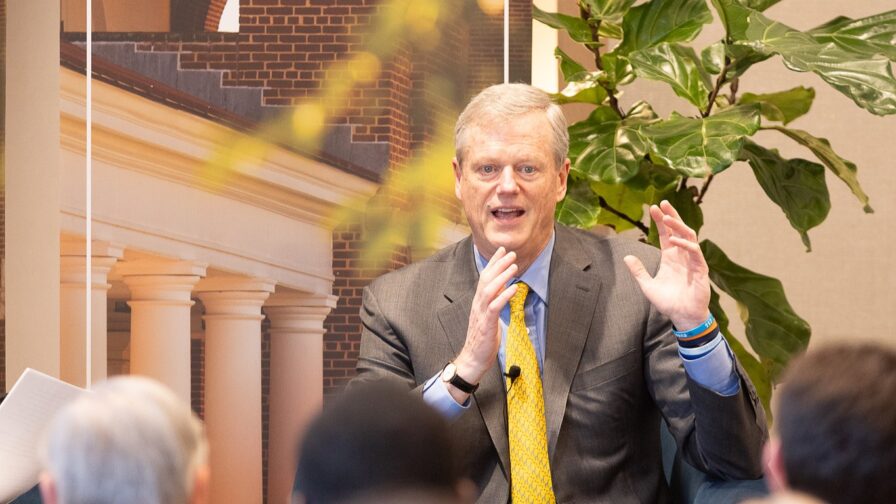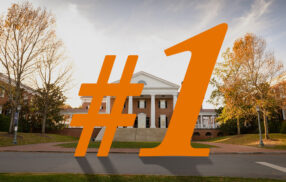
Charlie Baker Talks Leading NCAA Into Uncertain Future, Life Lessons With UVA Darden Students
By Jay Hodgkins
National Collegiate Athletic Association (NCAA) President Charlie Baker doesn’t back down from a challenge. Baker won two terms as governor as a Republican candidate in the predominantly Democratic state of Massachusetts, then joined the NCAA in 2023 as the national association for college athletics faced a swarm of lawsuits, landmark court decisions and new laws that were leading to tectonic shifts in the landscape.
Baker’s role guiding the NCAA into an uncertain future and his unique experience as a leader in the public and nonprofit sectors made him a dynamic case study for students at the University of Virginia Darden School of Business. He recently joined Professor Kimberly Whitler for a Q&A at The Forum Hotel on Darden’s Charlottesville Grounds, during which the two discussed leadership lessons from Baker’s career; the rise of name, image and likeness (NIL) for college athletes; and the bumpy road ahead for the NCAA and college athletics.
Reinventing the Top Tier of College Sports
Baker surprised many in the college sports world in December when he sent a letter to more than 350 universities that compete in Division 1 athletics, proposing the creation of a higher-tier subdivision in Division 1 in which schools would pay at least $30,000 per year to at least half of all eligible student-athletes. The premier subdivision would also operate under a to-be-determined set of new rules that could allow unlimited educational benefits for student-athletes and allow schools to directly enter into NIL licensing deals with athletes.
The proposals seemed like an unlikely shift for the NCAA. Yet, Baker is a proponent for radical change for an organization that declares on its own website that “legal shifts in the environment surrounding college sports have challenged the NCAA’s ability to serve as an effective national regulator for college athletics, resulting in an untenable patchwork of individual state laws.”
Asked where universities would find the money to fund those new expenses, Baker specified that the new top tier of college athletics would only include 60 or 70 schools. About 700 of the 1,100 participating colleges and universities spend less than $20 million per year on athletics, he said, with the next 300 spending less than $50 million. Those schools would continue to compete in college athletics as they have been, Baker predicted.
For schools positioned to compete in the new subdivision, Baker said the funding requirements are achievable, particularly when accounting for new revenue generated by the new college football playoff television contract and other sources. “Women’s sports are going to continue to be worth a lot more. Men’s basketball is going to be worth more. Donors have shown they’re willing to support athletics more.”
Whether it be through the new subdivision he proposed or a competing proposal, Baker said the fundamental goal should be to “let the big boys and girls play in a world that makes sense for them and let everyone else play in a world that makes sense for them.”
Baker said his proposal also addresses a major concern about time restraints facing student-athletes that prevent them from taking internships, studying abroad or even earning enough credits to graduate before their eligibility expires. With enhanced educational benefits, Baker said it will be required for schools to set aside funds to give student-athletes the ability to cover living expenses to finish their degrees or take an internship after their eligibility expires, so that they leave college prepared for their professional lives after athletics.
NIL
NIL has taken the college sports world by storm since the NCAA in 2021 updated its policy to allow student-athletes to profit from the use of their name, image or likeness. Since that time, some popular athletes have inked multimillion dollar deals to promote national brands, while thousands more have earned some income through endorsements, appearances and as social media influencers.
But NIL is still considered a wild west, governed by a patchwork of state laws, university policies and NCAA rules that create a confusing compliance environment and uncertain enforcement. Baker said the landscape has become rife with shady third-party actors taking advantage of student-athletes. For example, he said there was an alarming number of student-athletes being urged by third parties to enter their names into the transfer portal — the NCAA’s process for student-athletes to transfer from their current school and team to a new one — for a big NIL payday, only to be left with nothing.
“There are a lot of players coaxed into the transfer portal because someone told them there’s something better out there, but really that person is just looking for one linebacker for somewhere else,” Baker said. “They coax five people into the portal, and they go ask a coach, ‘Who do you want?’ Once the coach says which one, the other four are left out,” often with nowhere to go.
Whitler, co-author with Jay Hodgkins of the book “Athlete Brands: How to Benefit from Your Name, Image & Likeness” from Darden Business Publishing, encourages student-athletes to focus on their athlete brands — the reputation they want to earn which then guides their actions. By aligning their actions with their desired athlete brand, Whitler believes athletes will be better equipped to make decisions set them up for success, whether that is a career in professional sports or not.
Baker believes the NCAA made a big mistake not supporting NIL initially, and again by not putting a framework in place to oversee it after the U.S. Supreme Court’s NCAA vs. Alston decision.
“There are no rules or consequences for doing bad things, which people do every day,” Baker said. “Now, we are in the process of trying to put some consumer protections in place for a system that has no accountability.”
Leadership Lessons
Baker’s career has taken a winding path from politics and state government to CEO of Harvard Pilgrim Health Care for a decade to two terms in the governor’s office in Massachusetts, then to the NCAA. Each stop has offered monumental challenges, leaving Baker with indelible lessons.
Learn from failure: When Baker lost the Massachusetts governor’s election in 2010, a friend told him: “You spent too much time talking to your customers and not enough time talking to your prospects.”
It meant he spent too much time talking to his likely voters and not enough time with those who might vote for him. When he decided to run for governor again, he used a much different strategy, including spending significant time in places like Lawrence, Mass., that were very diverse and had no history of producing Republican votes. Baker ended up losing in Lawrence by only 50 votes, with the highest number of Republican votes ever. “The reason we won that campaign is that we did exactly the same as we did in 2010 in the places I was supposed to win, but I won just enough extra votes in the places we lost in 2014.”
He said if he hadn’t run in 2010 and learned from failure, he wouldn’t have won in 2014. “There’s tremendous value in learning from your failures.”
Listen: Baker said his parents taught him the lesson to listen first, then talk. “If you didn’t listen first, you would lose your turn to talk. My father’s favorite expression was, ‘Worry about your receiver, not your transmitter.’ You get so much smarter from sucking up everybody else’s knowledge.”
Leaders support the people around them: Baker said most professionals worry more about managing up, to impress their bosses, than about managing sideways and down. “If you put people in the right job and make sure they can succeed, they will run through a wall and be successful. Most [managers] succeed and fail based on the work of the people around them. That is very misunderstood. If you’re a manager, your job is to make sure everyone else can succeed.”
Focus on your health and well-being: “When I was in my late 40s, I was trying to turn around a health plan that was on the verge of bankruptcy and I had three kids under 10. I was taking horrible care of myself,” said Baker, now 67. A doctor told him, “You’re over worked, over stressed and you’re not doing anything to take care of yourself. You have a daughter who’s not going to get married until your 60s. Do you want to be able to walk her down the aisle or not?” That led him to make many changes in his life, including going to the gym three times a week, which he said made a huge difference in his physical and mental health. He has also focused on eating better and getting more good nights of sleep.
Accept bad news with grace: Bad news is part of trying to do anything important, Baker said. It’s natural that there will be setbacks. Leaders must be able to hear about them calmly, acknowledge the problems and fix them. Leaders who react poorly to bad news will stop hearing what they need to hear from those around them.
“The lines anywhere aren’t straight,” Baker said. “But you’ll do way better if the people around you believe you’re on their side.”
The University of Virginia Darden School of Business prepares responsible global leaders through unparalleled transformational learning experiences. Darden’s graduate degree programs (MBA, MSBA and Ph.D.) and Executive Education & Lifelong Learning programs offered by the Darden School Foundation set the stage for a lifetime of career advancement and impact. Darden’s top-ranked faculty, renowned for teaching excellence, inspires and shapes modern business leadership worldwide through research, thought leadership and business publishing. Darden has Grounds in Charlottesville, Virginia, and the Washington, D.C., area and a global community that includes 18,000 alumni in 90 countries. Darden was established in 1955 at the University of Virginia, a top public university founded by Thomas Jefferson in 1819 in Charlottesville, Virginia.
Press Contact
Molly Mitchell
Associate Director of Content Marketing and Social Media
Darden School of Business
University of Virginia
MitchellM@darden.virginia.edu




